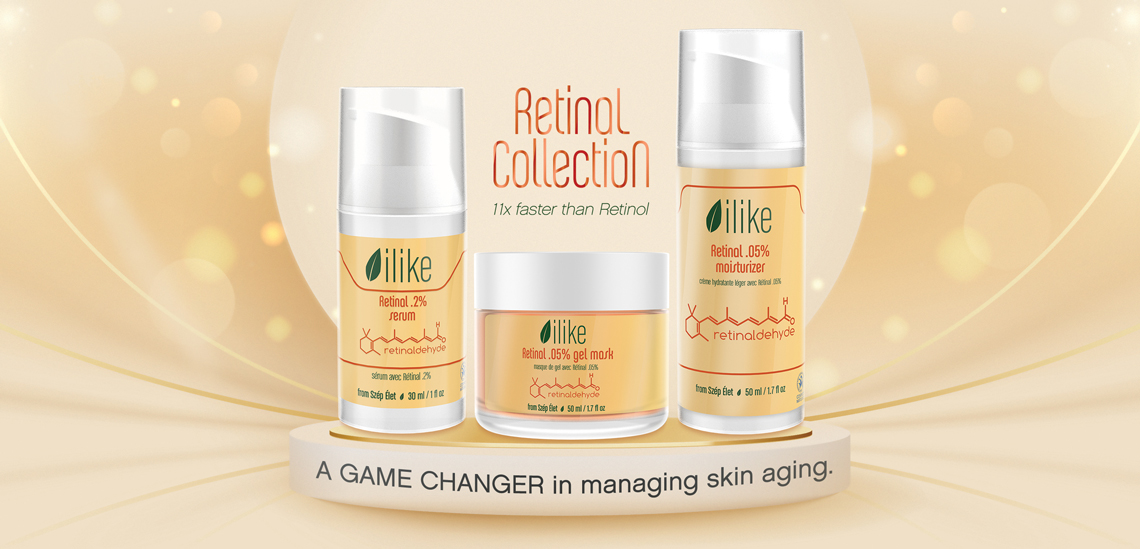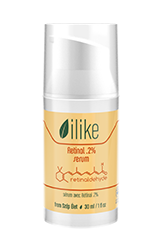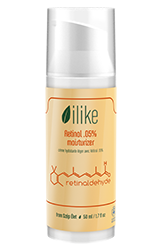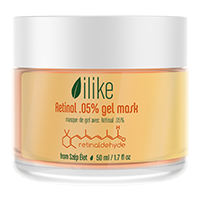Retinal vs Retinol?
Vitamin A has long been known as the gold standard of anti-aging. This powerful molecule resurfaces skin, enhances collagen production, reduces blemishes, fades fine lines and wrinkles, and brightens the complexion.

Vitamin A comes in many different forms. There’s the tried-and-tested – retinol and retinoic acid – then there’s the next generation molecule, the Retinaldehyde (Retinal).
The Vitamin A cycle
When Vitamin A is not being used by the body, it is stored within the skin cells as Retinyl Esters. Once the body is ready to metabolize Vitamin A, these esters are converted first to Retinol, and then to Retinaldehyde (Retinal) before ultimately becoming Retinoic Acid.
Retinoic Acid...
...is the active form of Vitamin A that is utilized by the skin to speed up cellular regeneration and collagen production plumping the skin while reducing fine lines and wrinkles. It inhibits excess melanin production to brighten the skin for an even complexion. It also helps to strengthen the skin barrier, reduce water loss, and protect existing collagen fibers.

All variations of Vitamin A, including Retinol and Retinal, must be converted to Retinoic Acid before they can take effect. Retinol first converts to Retinaldehyde (Retinal) and then to Retinoic Acid, while Retinal only requires one conversion step to Retinoic Acid. This last step is extremely rapid compared to the previous conversion, and that is why Retinal can provide accelerated results.
Retinal is the natural precursor of Retinoic Acid, therefore, it is the closest thing to prescription strength Retinoid.
Retinal,...
...one of the most effective anti-aging ingredients, has been clinically proven to work up to 11 times faster than Retinol. Simplified, a 0.2% Retinal product works as fast as a 2.2% Retinol product. In other words, the results we can achieve with Retinol in year, we can already see in about a month with Retinal usage. This makes it ideal for mature skin types that want to see a significant improvement in fines lines and wrinkles as quickly as possible. The shorter effecting period also reduces the chance of irritation, which happens more frequently with Retinol.
Retinal has a much higher exfoliation rate than Retinol, which contributes to more even-toned, radiant skin, and the fading of hyperpigmentation.
Furthermore, Retinal is the only retinoid with direct antibacterial properties. While Retinol clears away pore-clogging dead skin cells and reduce oil production, Retinal adds the bacteria inhibiting effect. This makes it perfect for those prone to blemishes, as well.
So why would you choose Retinol, when you get
11 times faster and better results with Retinal?
The Evolution of Retinal
Vitamin A has been used in medical treatment since the ancient Egypt. However, dermatologists began to recognize its topical effects only in the early 1960s, when researchers discovered that Retinol could alleviate dry, itchy skin conditions such as dermatitis, and this discovery sparked years of extensive studies and clinical trials.
By 1969, Retinol became recognized as an effective acne treatment because it speeds up the natural exfoliation process, and subsequently, unclogs pores and prevents breakouts.
Within 5 years, dermatologists noticed that acne patients who had been prescribed Retinol were achieving anti-aging results in addition to clear skin. At this point, Retinol transitioned from an acne treatment to the gold standard of anti-aging.
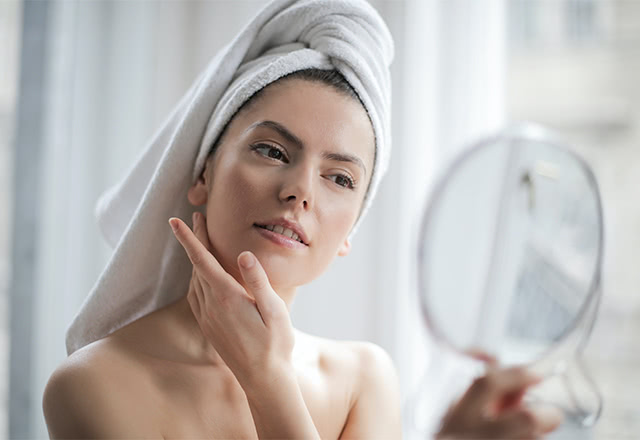
Retinal has been around as long as Retinol, but has not been studied to the same extent primarily because it is extremely difficult to stabilize, so until recently it could not be safely formulated into skin care products. Thanks to latest developments in biochemistry, stable Retinal is now available. Studies show that Retinal has all the benefits of Retinol with the added benefit of accelerated action and direct antibacterial activity.
Today, Retinal is very rarely used compared Retinol, because it is an expensive ingredient, and difficult to formulate with. That is why not every Retinal product will be as equally amazing: its effectiveness depends upon how advanced the manufacturing technologies are. In the future, we may see Retinal on a par with Retinol in terms of being the gold-standard of the medical skincare community.
And how about the strength? Researchers say to achieve impressive results, a percentage between 0.01% and 0.1% Retinal is needed. Remember, while these are tiny percentages, Retinal is 11 times faster than Retinol, therefore these strengths are much lower than those needed for Retinol to have the same effect. The ‘sweet spot’ percentage (big results, little irritation) is 0.05%, therefore this is the minimum in our Retinal products (moisturizer and mask), and we took the % level all the way up to 0.2% in our serum to provide a solution for more intensive needs.
What Retinal is Good For
| WHAT IT DOES | HOW IT DOES IT |
|---|---|
| reduces fine lines and wrinkles, tightens the skin | increases collagen production, dramatically speeds cell regeneration |
| brightens skin, evens skin tone | exfoliates the skin overtime, inhibits excess melanin production |
| reduces acne blemishes | antibacterial properties, normalizes the sebum production |
How To Use Retinal
To incorporate Retinal for acne treatment, one can start to use it in their early 20’s, while for anti-aging benefits, Retinal is typically a good option from the mid 20’s, early 30’s.
Retinal is used across the entire face, neck and décolletage. Spot-treating certain areas of the face with Vitamin A is an unusual practice. We recommend applying Retinal to the entire face even if the main concern is in a specific area. Vitamin A helps to prevent signs of aging as well as correcting them, and can effectively treat one area while preventing aging in others.
But how about the eyes? Vitamin A is very beneficial to this extremely delicate area, too. This area is particularly prone to sensitivity, but that doesn’t mean you have to forgo the anti-aging benefits of Retinal around the eyes. Just be sure to use the products carefully in the eye area, avoiding the lids and direct eye contact. Explain this to your clients when they use the products at home.
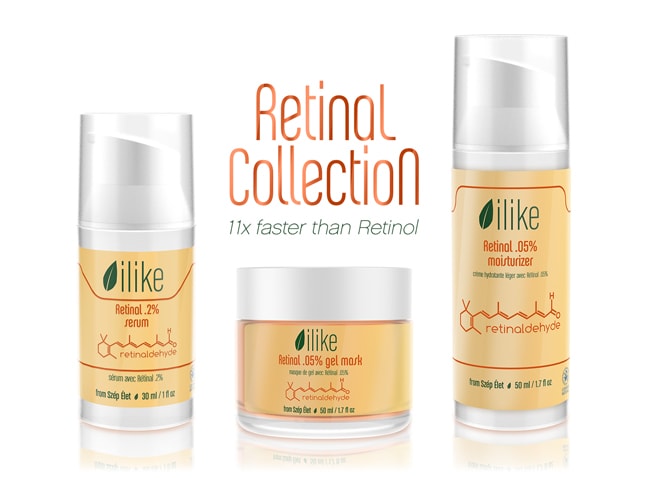
Retinal may cause mild irritation when first introduced to the skin (this can last for a month or longer), but these effects are typically temporary, and usually occur when Vitamin A has been introduced too quickly or in too high of a percentage.
Introducing Vitamin A into someone’s routine gradually is the optimal way to avoid irritation. Begin with a lower percentage or less frequent application. Use our products every other day in the beginning. After two weeks (or earlier if there is no sensitivity), increase the application to daily. Two times a day application works well if no irritation occurs. For more sensitive skin, once a day (night-time) application is recommended.
Consistency with regular use is essential. We recommend a minimum of 3 months of treatment, and as long as the skin sees benefits.
It is normal for Retinals to be somewhat drying due to an increased rate of exfoliation. Keeping the skin hydrated by layering serums and a moisturizer will minimize the irritation.
Sun protection is always recommended during the usage period.
Contraindications
- Do not mix Retinal (or use on the same day) with other strong, skin resurfacing actives such as AHAs or BHAs.
- It is not recommended to use Retinal while pregnant or breastfeeding (without the doctor’s approval).
Retinal Collection
Additional Active Ingredients
- Apricot: Fresh apricot has been used to treat skin diseases for centuries. It can be applied with beneficial results in eczema, sunburn and itching of the skin due to cold exposure.
Read more...
Apricot
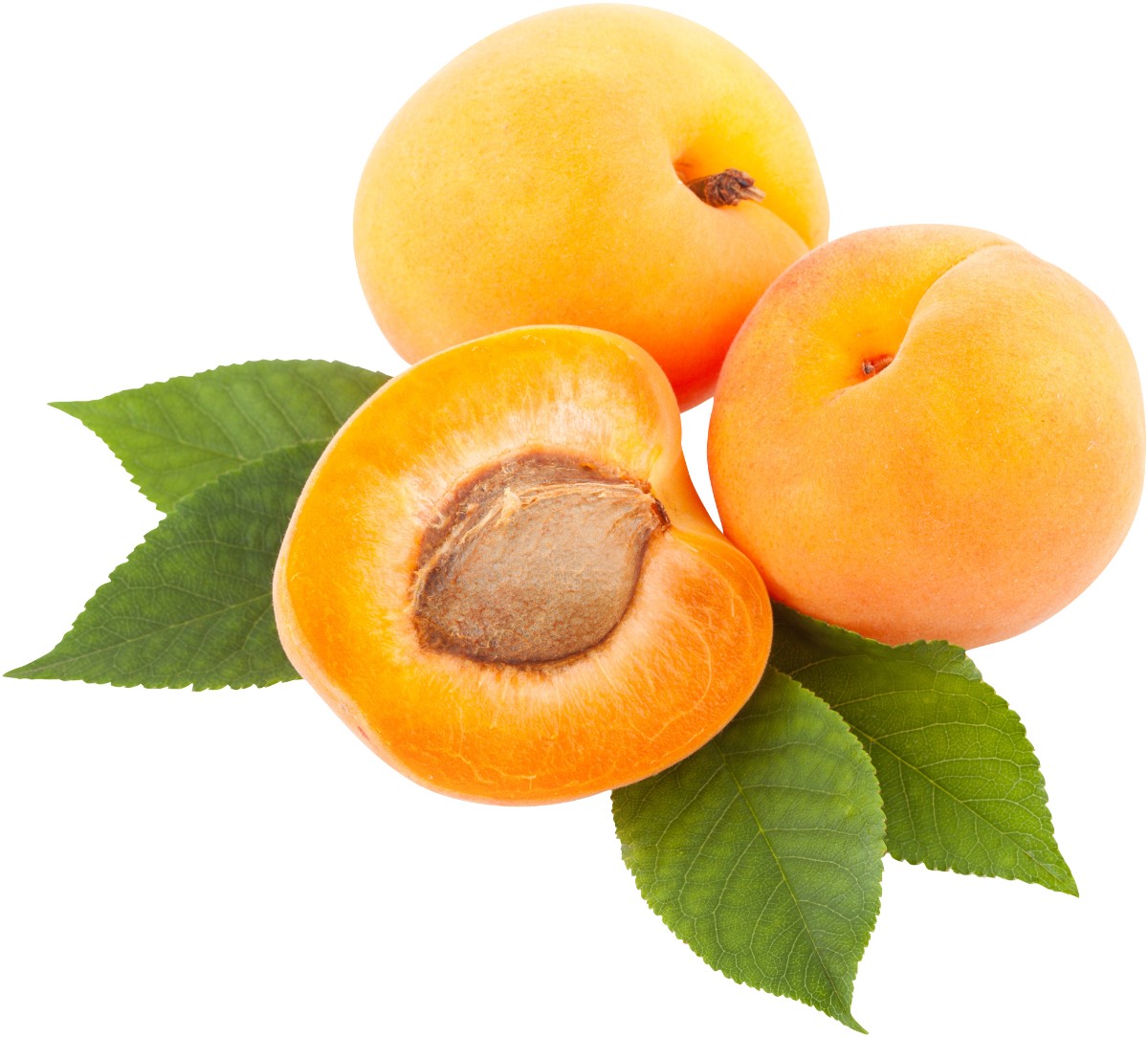
Fresh apricot has been used to treat skin diseases for centuries. It can be applied with beneficial results on eczema, sunburn and itching of the skin due to cold exposure. It helps to maintain the softness and radiance of the skin. Its Vitamin C and E content helps to fight the signs of aging and reduce wrinkle lines. Its high-level Beta-carotene content supports the effects of Retinal in the products.
- Carrot: Carrots contain a particularly high content of Vitamin A in the form of Beta-carotene. Beta-carotene is an antioxidant, and thus it prevents cell degeneration.
Read more...
Carrot
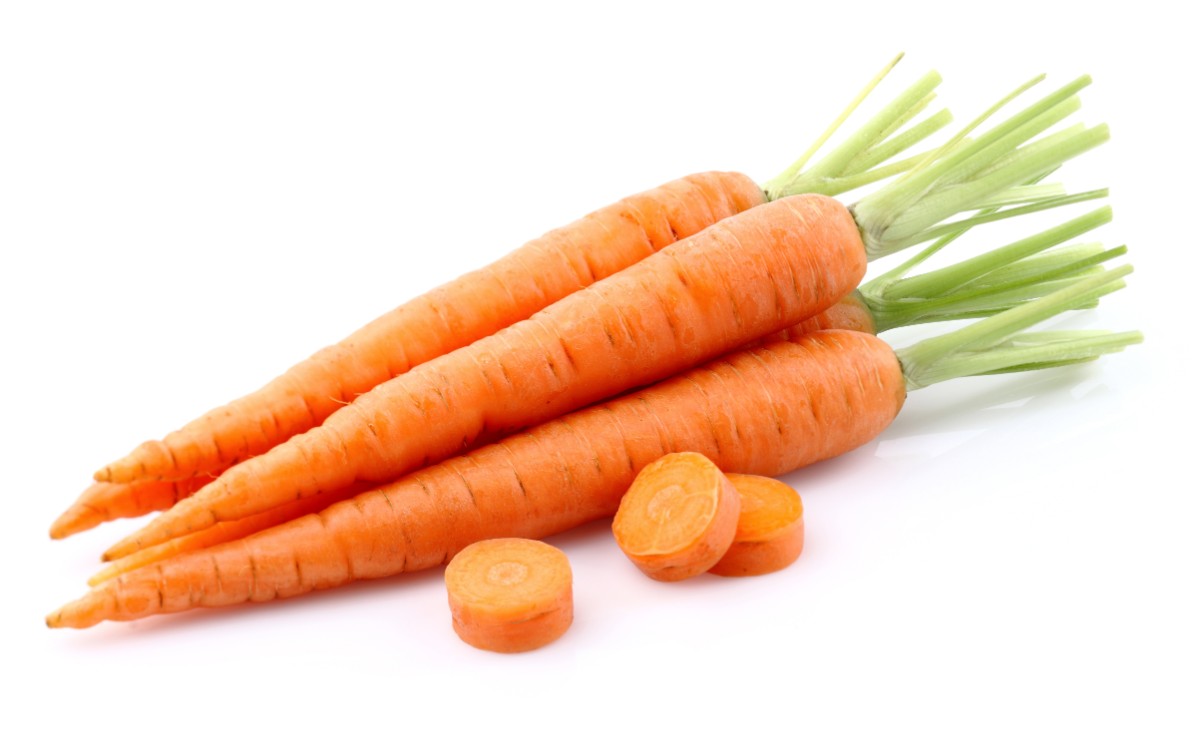
Carrots contain a particularly high content of Vitamin A in the form of Beta-carotene. Beta-carotene is an antioxidant, and thus prevents cell degeneration. Antioxidants slow down the aging process by neutralizing damage-causing free radicals. Carrots are also high in B complex vitamins and many minerals including calcium, copper, magnesium, kalium, potassium, phosphorus, iron, and folic acid.
- Rowan Sorb: Rowan sorb (or sorb apple) berries make a great ingredient in skin care products, because besides their Beta-carotene content, they are also rich in Vitamin C, a well-known skin brightener that can help to reveal radiant looking skin.
Read more...
Rowan Sorb
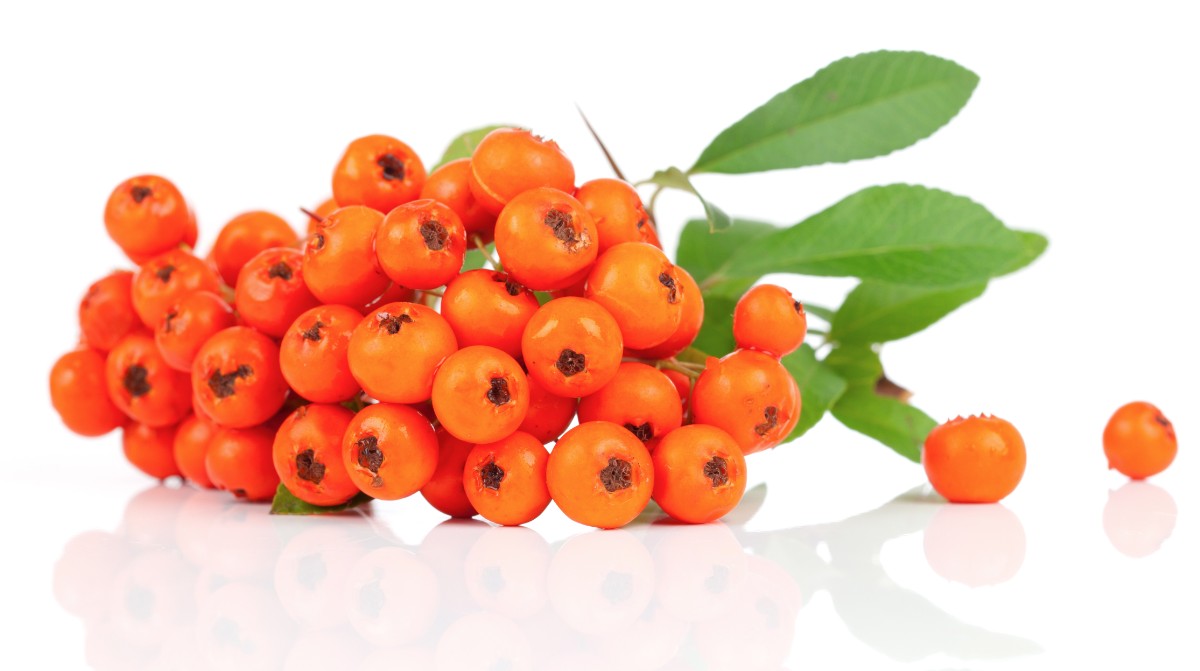
Rowan sorb (or sorb apple) berries make a great ingredient in skin care products, because besides their Beta-carotene content, they are rich in Vitamin C, a well-known skin brightener that helps to reveal radiant looking skin. The rowan berry's fruit acids also help to exfoliate, working to minimize pores, tighten the skin, and encourage a healthy-looking complexion.
- Sea Buckthorn: With over 190 bioactive compounds, sea buckthorn is an unsurpassed source of Omegas 3, 6, and 9. And it is the world’s richest source of the elusive essential fatty acid, Omega-7, a fatty acid vital to collagen production and healthy skin, hair and nails. Furthermore, it is very rich in vitamins, and is an especially great source of Vitamin C.
Read more...
Sea Buckthorn
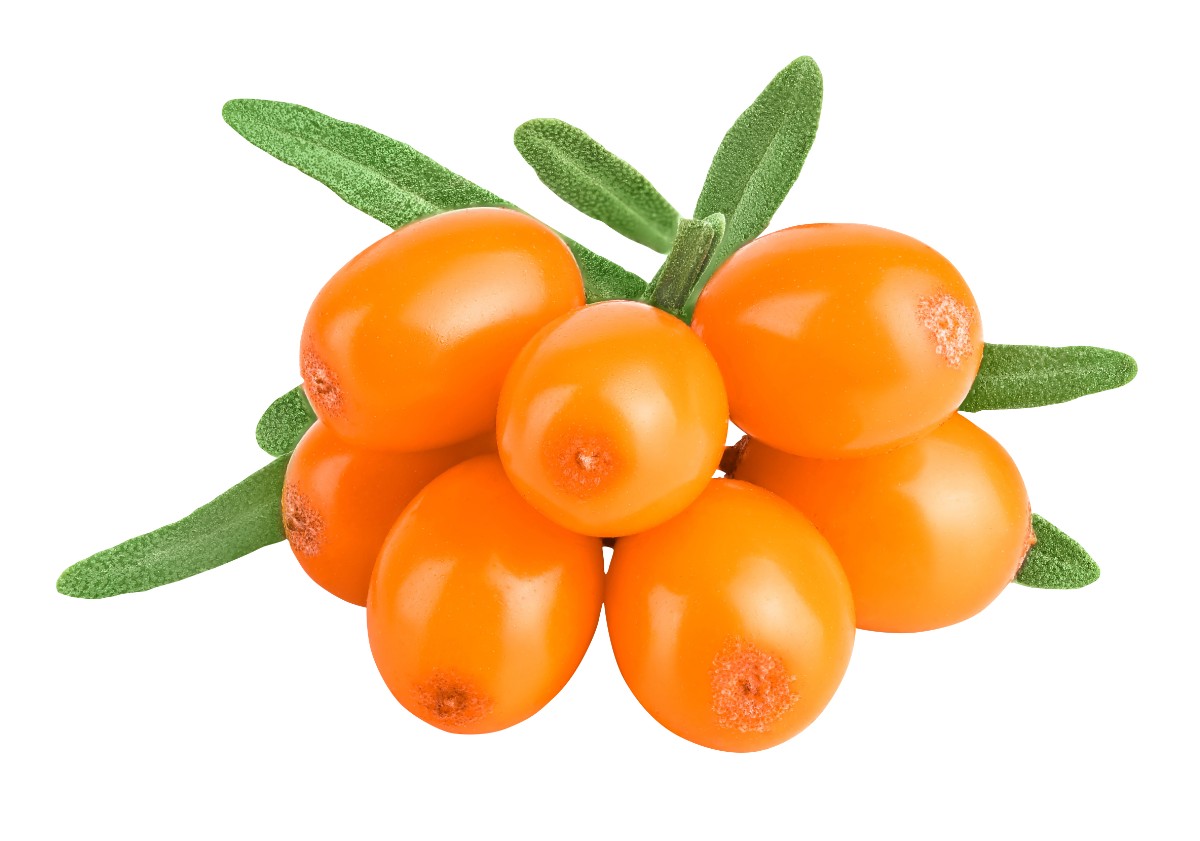
Sea buckthorn grows throughout Europe and Asia. The leaves, flowers, seeds, and fruits are used as medicine. The berries fortify themself against the elements by producing an array of powerful nutrients. With over 190 bioactive compounds, sea buckthorn is an unsurpassed source of Omegas 3, 6, and 9. It is the world’s richest source of the elusive essential fatty acid, Omega-7, a fatty acid vital to collagen production and healthy skin, hair and nails. Furthermore, it is rich in vitamins, and an especially great source of Vitamin C.
For dozens of centuries in various parts of the world - including the ancient Greeks and Genghis Khan -, the tart, bright orange sea buckthorn berry has been used to rejuvenate, revitalize and restore, both inside and out. Traditional health-related uses for sea buckthorn berries include sustained energy levels, improved cellular health, cardiovascular and joint support, healthy inflammation response, improved immune health.
Essential Fatty Acids: sea buckthorn is a rich source for fatty acids, Omega 3, 6, 7 & 9, essential to cellular support and protection to promote healthy skin.
Omega 7 provides key building blocks for skin, hair and nails. It helps combat wrinkles, dryness, loss of elasticity, and other symptoms of malnourished, damaged or aging skin. It assists the skin by supporting numerous functions, including:
- Boosting collagen production
- Protecting against oxidative damage
- Restoring youthful resilience and plumpness to aging skin cells
- Rejuvenating skin cell membranes
- Enhancing the skin’s ability to retain moisture
- Repairing sun-damaged skin
- Protecting against sun damage, toxins and environmental stress
- Addressing eczema and rosacea symptoms
Phytosterols and polyphenols: plant-based nutrients and powerful antioxidants. The same components that keep plants healthy can also help support healthy skin tone and texture.
Amino acids: the building blocks of protein vital for tissues of the body to optimally perform.
Carotenoids: there are 50 carotenoids present in the modern diet. Sea buckthorn has 39 of these antioxidants, including lutein, zeaxanthin, alpha-carotene, beta-carotene, and lycopene to keep free radicals under control.
Vitamins and minerals: loaded with vitamins C, A, B-1, B-2, E folic acid and B12 plus a variety of essential minerals for a healthy body and healthy skin.
- Hyaluronic Acid: Hyaluronic Acid is essential is skin care, as it maintains the hydration, plasticity and viscosity of the skin. Literally acting like a sponge, Hyaluronate can reach a level of water retention up to 1,000 times of its own weight.
Read more...
Hyaluronic Acid
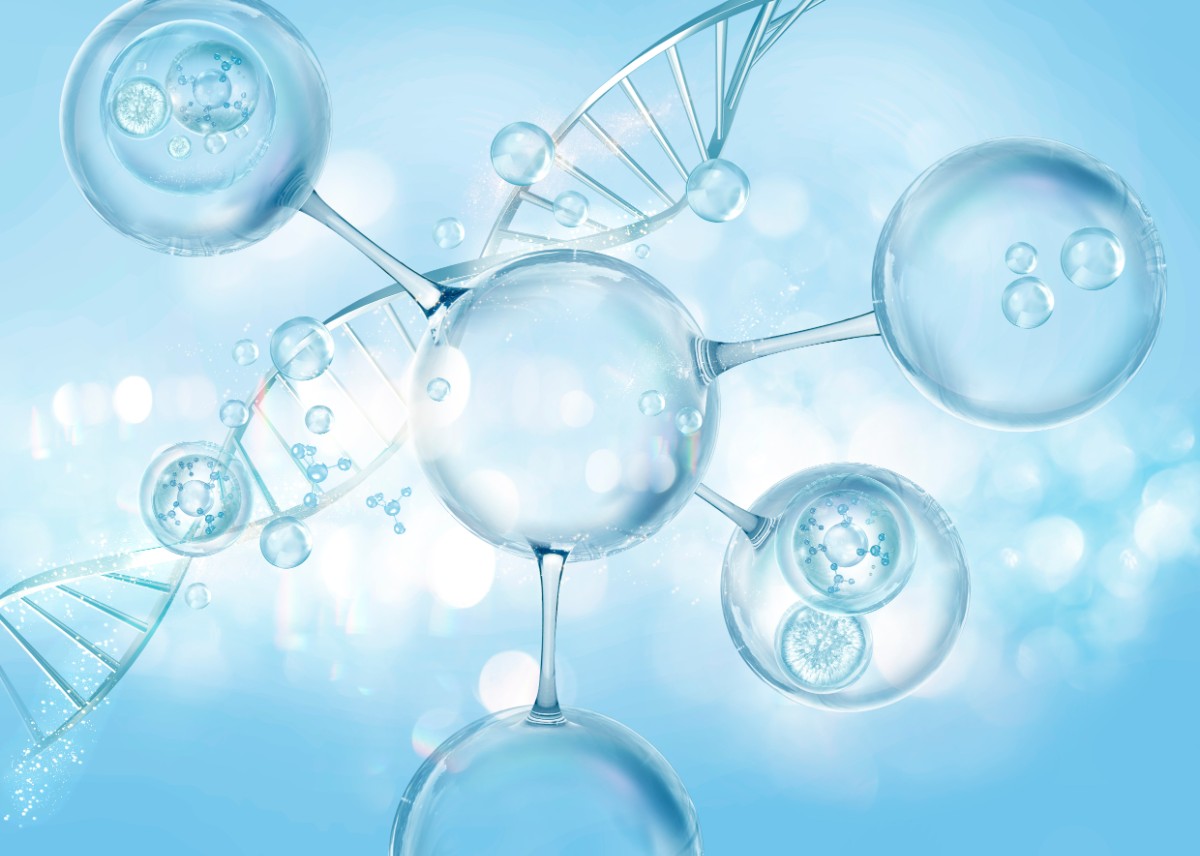
Hyaluronic Acid is the main component of a family of polysaccharides similar in structure and behavior to the amino sugars better known as glycosaminoglycans (GAGs). Hyaluronic acid is mainly spread in the connective tissue where it is the major constituent making up cartilage. It is responsible for firmness, elasticity and hydration.
Hyaluronic Acid is essential in skin care, as it maintains the hydration, plasticity and viscosity of the skin. Literally acting like a sponge, Hyaluronate can reach a level of water retention up to 1,000 times of its own weight. Hyaluronic Acid is naturally present in the skin as our cells produce about 5 grams of it per day, however as we age, the percentage of Hyaluronic Acid in the skin decreases accounting for the loss of hydration and moisture.
In our products, the small molecular size Hyaluronic Acid penetrates deeper to plump the skin from the inside out, while the medium molecular size Hyaluronic Acid forms a barrier layer on the skin surface to further hydrate and minimize moisture evaporation.
- Ascorbic Acid (Vitamin C): As a water-soluble antioxidant, Vitamin C protects the water-containing portions of cells, interior cell structures, and interstitial fluid.
Read more...
Vitamin C
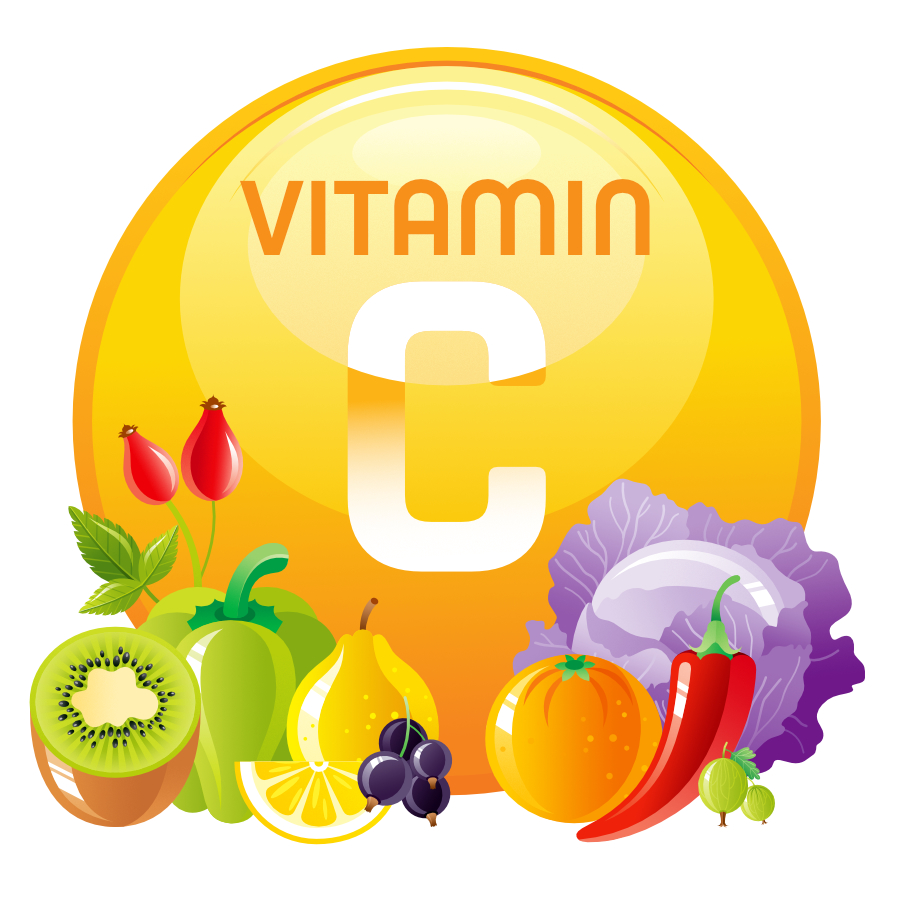
Vitamin C is one of the most widely used and well-studied skin care antioxidants. You may also find it listed as L-ascorbic acid or ester-C. Besides fighting free radical damage, Vitamin C helps stimulate collagen production to keep skin firm and is the best antioxidant for fading dark marks. As a water-soluble antioxidant, Vitamin C protects the water-containing portions of cells, interior cell structures, and interstitial fluid. Scientific studies have found that when lab animals eat Vitamin C fortified food, their skin is better able to fight oxidative damage. Therefore, it is important to replenish the skin's vitamin C stores every day derived directly from fruits and vegetables. Good sources include sea buckthorn, cantaloupe, peppers, oranges, lemon and tomato.
Retinal .2% Serum
30 ml / 1 fl oz
Skin renewal serum encouraging cell reproduction, collagen production and elasticity to reduce the appearance of fine lines and wrinkles, and leave the skin feeling tight and smooth.
Active Ingredients: Apricot, Carrot, Rowan Sorb, Sea Buckthorn Oil, Calendula, Shea Butter, Corn Germ Oil, Retinal, Hyaluronic Acid, Ascorbic Acid, Sunflower Seed Oil -- Vitamins A, B, C, D and E, Bioflavonoids, Fructoses, Fruit Acids, Fatty Acids, Pectins, Beta-Carotene (Provitamin A), Biosugars, Plant Proteins, Mineral Salts, Trace Elements
Clinical Studies (Retinal .2% Serum)
Report No. L602/23/JSHH
Dermatological test
The patch test study was performed under dermatological control on a group of 25 volunteers. The study concluded that the volunteers didn’t report documented oversensitivity or a history of adverse reactions to individual ingredients of the tested product, which was well tolerated by the skin. In the tested group of volunteers there were no irritations or allergic reactions. The product meets the requirements of compatibility test with the skin (Skin Compatibility Test).
Report No. 90934/21 JSHH report: user and instrumental test under dermatological control
- Users: 25 people, females, 25+ years old
- Skin types: all skin types (dry, normal, combination, oily), sensitive, non-sensitive
- Usage: daily on clean skin for 4 weeks
Declarations are confirmed only if the ratio of received positive responses to the total number of subjects participating in the study is above 50%. The study concluded that the tested product is very well tolerated by the subjects, there are no contraindications to its use.
Results after 4 weeks of use:
- 96% reported the feel of intense and deep hydration
- 93% reported that the product improved the skin texture by tightening and smoothing it, as well as improving elasticity
- 100% reported the sense of visible skin regeneration and renewal
- 70% reported the reduction of wrinkles and fine lines, and that the product helps to reduce the signs of skin aging
- 70% reported beneficial effects on Rosacea and Acne
- 100% reported improved skin appearance, fresh and healthy feel of their skin
- 100% stated that the product was good for all skin types
- 100% felt the product was easy and pleasant to use
Machine tests
10 people, 4 weeks of usage
- Instrumental test of skin moisturizing level using Corneometer® CM 825
- Product efficacy is confirmed in case of the positive results obtained in more than 50% of users. The product moisturizes the skin when the parameter value increases.
- Result: skin moisture level has increased in all participants compared to before usage, therefore the product moisturizes the skin.
Instrumental test of biomechanical skin parameter
using Cutometer® MPA 580
The product improves skin elasticity when the parameter value increases, improves skin firmness when the parameter value decreases.
Results:
- The product improves skin elasticity by an average of 10%
- The product improves skin firmness by an average of 15%
Wrinkle analysis
using Primos 3D Lite (images below)
The product reduces the length, the number, the volume and the area of wrinkles when the parameter values decrease.
Results after 4 weeks of use:
- reduces wrinkles length by an average of 5%
- reduces wrinkle count by an average of 15%
- reduces wrinkle volume by an average of 8%
- reduces wrinkle area by an average of 6%
Study Images
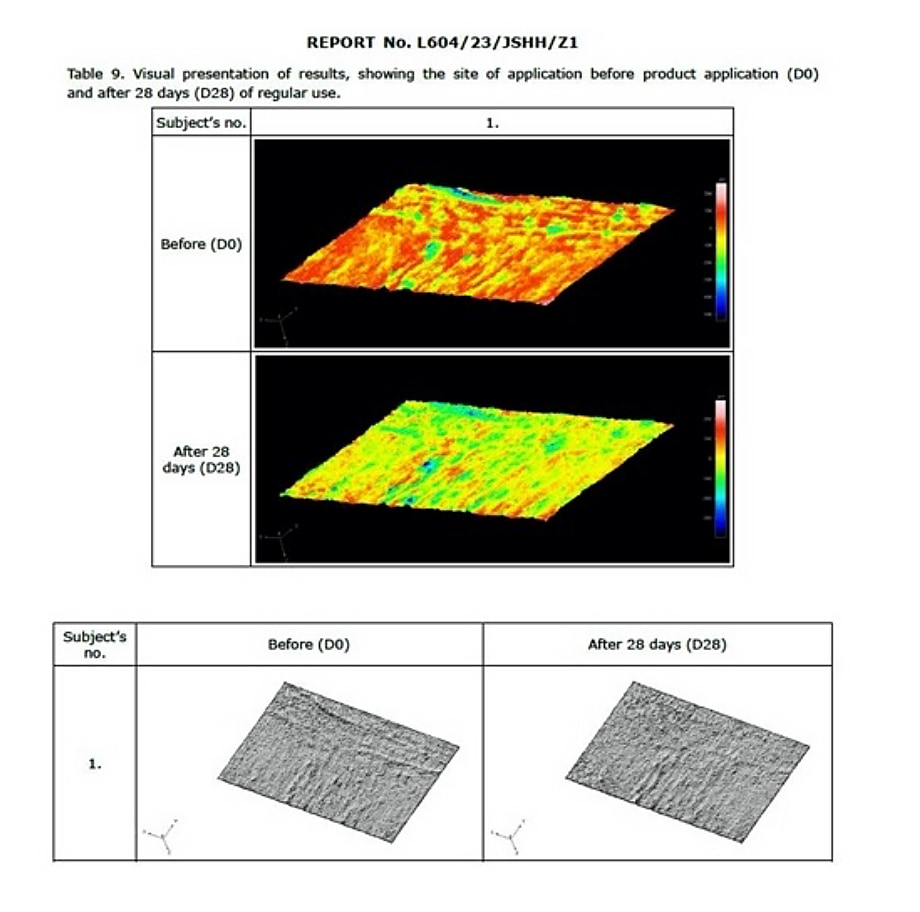

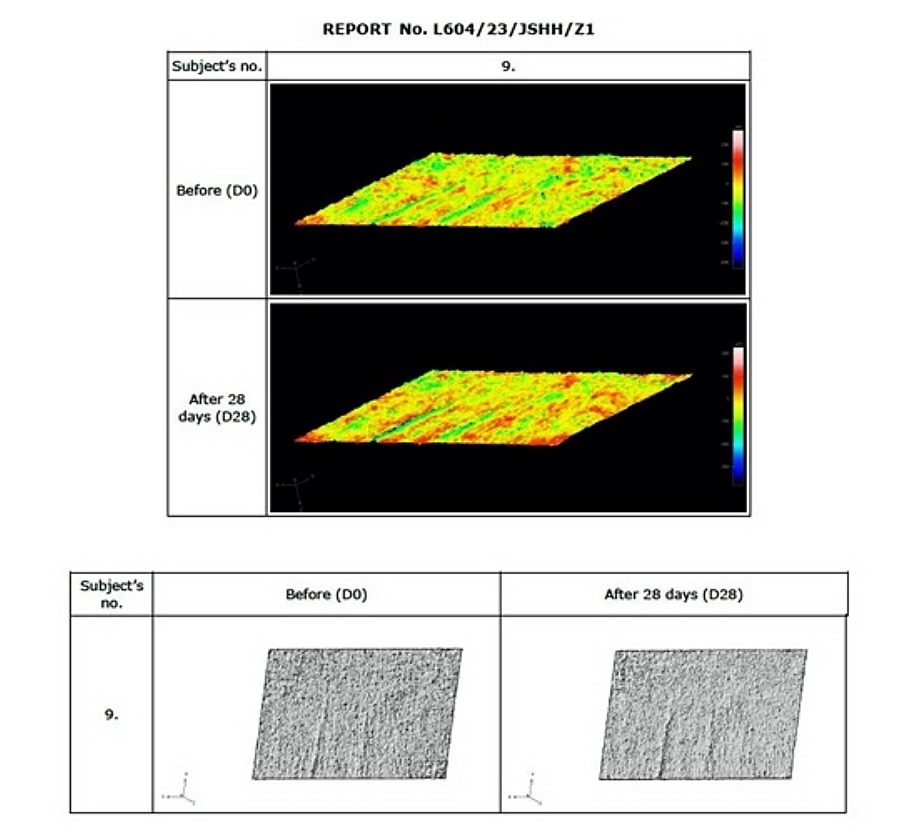
Retinal .05% Moisturizer
50 ml / 1.7 fl oz
Skin renewal moisturizer that assists cell reproduction and collagen production, the appearance of fine lines and wrinkles, leaving the skin feeling hydrated, smooth and fresh.
Active Ingredients: Apricot, Rowan Sorb, Carrot, Corn Germ Oil, Sea Buckthorn Oil, Hyaluronic Acid, Retinal, Ascorbic Acid, Sunflower Seed Oil -- Vitamins A, B, C, D and E, Bioflavonoids, Fructoses, Fruit Acids, Fatty Acids, Pectins, Beta-Carotene (Provitamin A), Biosugars, Plant Proteins, Mineral Salts, Trace Elements
Clinical Studies (Retinal .05% Moisturizer)
Report No. L36306/22/JSHH
user and instrumental test under dermatological control
- Users: 27 people, 25+ years old
- Skin types: all skin types, other skin types (Rosacea, Acne)
- Usage: daily on clean skin and eye area for 4 weeks
Declarations are confirmed only if the ratio of received positive responses to the total number of subjects participating in the study is above 50%. The study concluded that the tested product is very well tolerated by the subjects, there are no contraindications to its use.
Results after 4 weeks of use:
- 100% reported the feel of intense and deep hydration
- 100% reported that the product improves the texture of the skin by tightening and smoothing it, as well as improving its elasticity
- 92% reported the sense of skin regeneration
- 92% reported the reduction of new fine line appearances
- 92% reported the reduction of signs of aging (wrinkles)
- 96% reported beneficial effects on Acne
- 96% reported beneficial effects on Rosacea
- 100% reported improved skin appearance, fresh and healthy feel of their skin
- 100% stated that the product left a pleasant skin feel
- 100% felt the product was easy to use and apply
Machine tests
10 people, 4 weeks of usage
- Instrumental test of skin moisturizing level using Corneometer® CM 825
- Product efficacy is confirmed in case of the positive results obtained in more than 50% of users. The product moisturizes the skin when the parameter value increases.
- Result: skin moisture level has increased in all participants compared to before usage, therefore the product moisturizes the skin.
Instrumental test of biomechanical skin parameter
using Cutometer® MPA 580
The product improves skin elasticity when the parameter value increases, improves skin firmness when the parameter value decreases.
Results:
- The product improves skin elasticity by an average of 3%
- The product improves skin firmness by an average of 47%
Wrinkle analysis
using Primos 3D Lite (images below)
The product reduces the length, the number, the volume and the area of wrinkles when the parameter values decrease.
Results after 4 weeks of use:
- reduces wrinkles length by an average of 5%
- reduces wrinkle count by an average of 14%
- reduces wrinkle volume by an average of 9%
- reduces wrinkle area by an average of 4%
Study Images
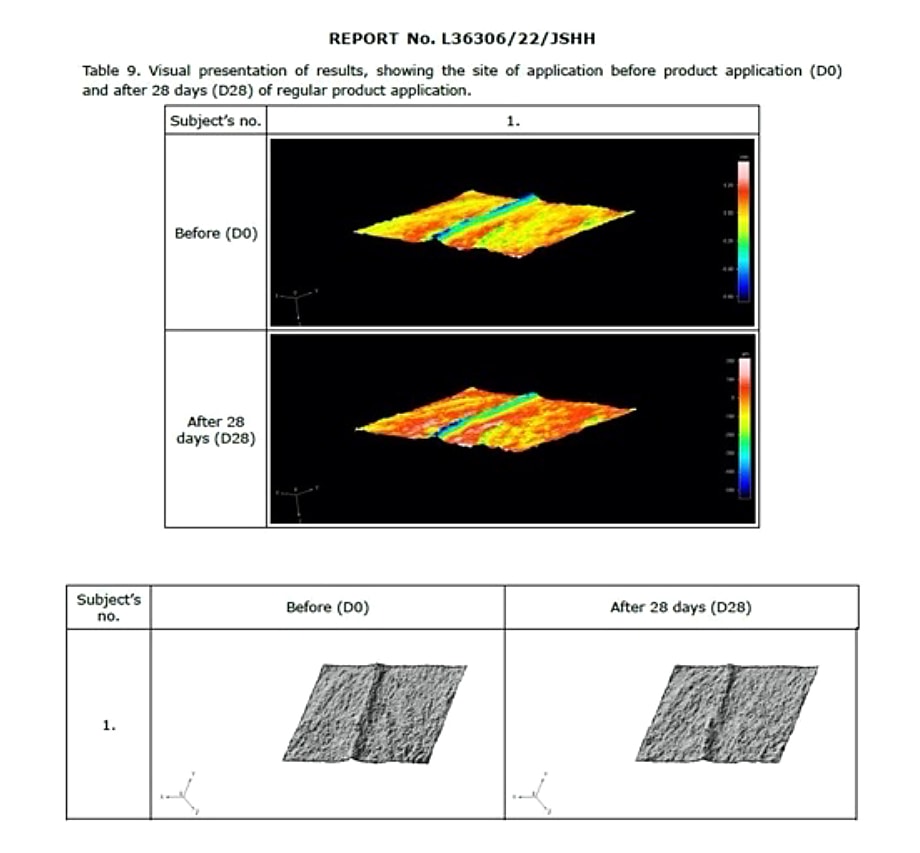

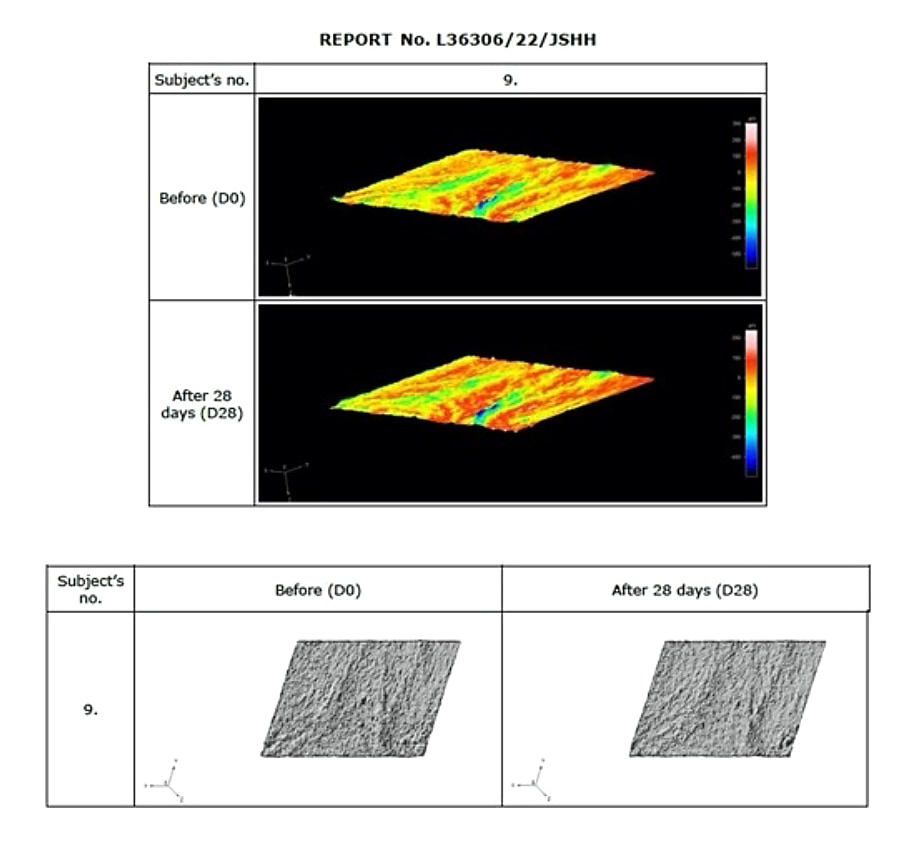
Retinal .05% Gel Mask
125 ml / 4.2 fl oz, 50 ml / 1.7 fl oz
Skin renewal mask that helps to increase collagen production and elasticity to reduce the appearance of fine lines and wrinkles, leaving the skin fresh and plump.
Active Ingredients: Apricot, Rowan Sorb, Carrot, Algae, Hyaluronic Acid, Retinal, Ascorbic Acid, Sunflower Seed Oil, Sweet Pepper -- Vitamins A, B, C, D and E, Bioflavonoids, Fructoses, Fruit Acids, Fatty Acids, Pectins, Beta-Carotene (Provitamin A), Biosugars, Plant Proteins, Mineral Salts, Trace Elements
Clinical Studies (Retinal .05% Gel Mask)
After 4 weeks of use:
- 93% reported the feeling of intense and deep hydration
- 85% reported the skin felt smoother and tighter
- 89% reported decrease in signs of aging, including wrinkles
- 78% felt that the product regenerates the skin
- 89% felt their skin softer and smoother, rough texture eliminated
- 93% felt the product easy to use (apply and remove)
Machine elasticity test
(Cutometer MPA 580)
After 4 weeks of use:
- Average 3% increase in skin elasticity
- Average 35% in skin tightness
